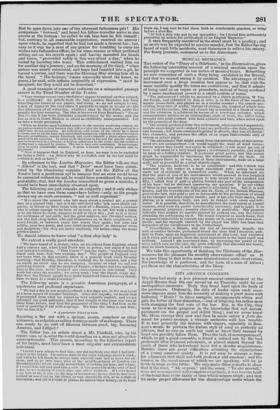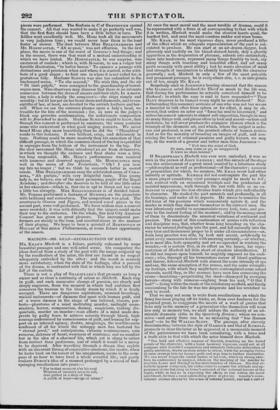CITY AMATEUR CONCERTS.
WE have had many a less pleasant musical entertainment at the Argyll Rooms than the one served up on Thursday night by our metropolitan amateurs. Truly they tread hard upon the heels of the professors. Ordinarily, the duty of leader upon such occa- sions imposes upon him the necessity of making a great noise with hallooing "Hush !" to those energetic accompanyists whose zeal gets the better of their discretion,—and of fatiguing his nether man with stamping the first note of the bar. But, in the City, they seem to have made progress in the knowledge that soft accom- paniments are the proper and skilful thing; and we never knew Mr. MORI (except that now and then he made rather a forte de- mand for piano) manage a strange orchestra with less trouble. It is now generally the fashion with singers, especially in Ros- SINI's music, to perform the Italian style of song so perfectly ad libitum, that no one on earth but such as know their manner by heart can possibly follow them. Thus the task of accompaniment, which, to get a good ensemble, is found a critical one by the best professors after repeated rehearsals, is placed almost beyond the reach of those who beforehand have but a slender acquaintance. Besides there are great difficulties attending the organization of a young amateur society. It is not easy to arrange a time for rehearsals that shall suit both professor and amateur; and the former, in the vocal music of which we are speaking, will be as liable to error as the latter. We only make these remarks to show that if the duet, " Ah se puoi," and the scene, " Tu che accendi," were not accompanied with complete exactitude, it was less the fault of the band than of the laxity of time which singers adopt ; and that we make proper allowance for the disadvantage under which the pieces were performed. The Sinfonia in C of BEETHOVEN opened the concert. All that was wanted to make it go perfectly well was, that the first flute should have been a little better in tune. The fiddles went excellently well. Mr. Moat took all the movements in very judicious time ; we would never hear them in the least faster or slower. The duet between Miss BELLCHAMBERS and Mr. HORNCASTLE, " Ah se puoi," was not effective. In the first place, the music is one of the worst of Ross ixi's bad things ; and in the second, there was that want of a mutual understanding at which we have hinted. Mr. HORNCASTLE, to our surprise, was exuberent of roulade; which is, with Rossiari, to use a vulgar but forcible illustration, "to butter bacon." To execute a passage with distinctness and precision when and where it is wanted, is the attri- bute of a good singer ; to foist one in where it is not called for, is gratuitous folly. Madame SCHUTZ was also too redundant in the hackneyed scene, " Tu che accendi." We wish this, and the air " Di tanti palpiti," were consigned to the guardianship of barrel- organ-men. Nice observers may discover that there is an intimate connexion between the dress of singers and their style. In a morn- ing robe, a lady is wholly the composer's—she sings simply and sensibly : but let her get on her head-dress and diamonds, and seven- eighths of her, at least, are devoted to the ostrich feathers and her- self. When we see the ominous plumes upon a lady's head, we tremble for the fate of the musician ; for, as sure as the judge's black cap precedes condemnation, the unfortunate composition will be flourished to death. • Madame SCHUTZ ought to know, that though this concert is performed by amateurs, the room contains some who understand in what good singing consists. We never heard Mom play more beautifully than he did the "Ploughboy" rondo to this fantasia. It was brilliant, crisp, and deliciously in tune. Nothing could be more masterly than his execution of that difficult passage, in which the common chord of the key is sprinkled in arpeggio from the bottom of the instrument to the top. For the slow movement Mr. MORI introduced an air from Artaxerxes, in which we thought the cadence and final shake were a little too long suspended. Mr. Mom's performance was received with immense and deserved applause. Mr. HORNCASTLE sang well in the scena of Der Freischutz, " Oh! I can bear my fate no longer ;" but we think he succeeds better in sacred music. Miss BELLCHAMBERS sang the celebrated scena of CIMA- ROSA, "Au parlate," with very delightful taste. This young lady is, we believe, one of the most promising pupils of the Royal Academy ; and therefore she deserves to be told of one little error in her execution—which is, that she is apt to throw out her voice a little too abruptly. Miss BELLCHAMBERS is of decided talent. Mr. FORBES performed a fantasia of HUMMEL on the pianoforte with brilliancy and correctness. The composition was good. The overtures to Oberon and Figaro, and several vocal pieces in the second part, were well performed. We have seldom seen a concert more crowded; it was with difficulty that the singers could make their way to the orchestra. On the whole, this first City Amateur Concert has given us great pleasure. The instrumental per- formers are steady in the time, and unostentatious in the manner of their playing. We hope to hear a quintett of BEETHOVEN or MOZART at this minor Philharmonic, at some future opportunity of the season.



















 Previous page
Previous page